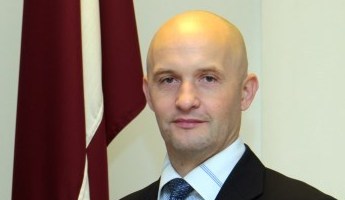 NATO countries may be ramping up their war of words in the coming weeks in Ukraine, where Russian propaganda flows freely into the east while ill-prepared security forces can’t even talk to one another.
NATO countries may be ramping up their war of words in the coming weeks in Ukraine, where Russian propaganda flows freely into the east while ill-prepared security forces can’t even talk to one another.
Multiple officials who spoke with U.S. News say planning is underway to bolster the Ukrainian government’s ability to communicate among its security services and broadcast to the general public. The details are still being worked out, including whether this would require troops from NATO countries on the ground in Ukraine to train and support the effort.
“We are starting some projects together with others, understanding the time factor is of the essence,” says Janis Sarts, Latvia’s state secretary of defence and second highest ranking official at the ministry.
“We’re looking at something that would help Ukrainians to deal with the propaganda that is going on,” he tells U.S. News. “We’ve heard this is a very interesting proposition for [Ukraine].”
The U.S. has been involved in these discussions, Sarts says. When asked whether the prospective plans would include putting troops or trainers on the ground in Ukraine, he says, “Yes. I think that would help.” He declined to comment further on the size, scope and cost of the mission.
The Pentagon did not respond to requests for comment in time for this report. A NATO official says the treaty organization does not envisage a “mission,” as such, on this issue.
“NATO Allies are actively considering ways to further strengthen our long-standing cooperation with Ukraine, including in the area of public diplomacy,” the official said by email, speaking on the condition of anonymity. “Allies are also providing assistance to Ukraine on a bilateral basis. . . .”
Russia’s incursion into Caucasus six years ago proved Putin’s “expansionist, imperialist” strategy could work, says Sven Misker, the Estonian minister of defence. The Russian president orchestrated the seizure of Georgian territory with military force, and then sashayed the international conversation to one of de-escalation and peace, leaving the legitimacy of his new lands a fait accompli.
“It’s sort of a ‘We told you so’ moment,” Misker said Wednesday afternoon, while speaking on a panel at the Atlantic Council. “Georgia should have been the wakeup call. We decided to push the snooze button and go back to sleep. We shouldn’t let anything like this happen this time with regards to Ukraine. Not because Ukraine is any larger or more important — no country is less important than any other country — but because now we see a pattern. . . .”
Countries like Ukraine “are just lousy” with Russian spies, [UC Berkeley professor M. Steven] Fish says, which is why it’s been so difficult for Ukrainian security officials to communicate with one another, and for the U.S. to trust sharing information with them.
“It’s not that [the U.S.] doesn’t trust Ukrainians to do the right thing, or that they can’t handle the information,” he says. “It’s that any information we pass down is going to get to Moscow in a matter of hours.”
“These folks not only report back to Moscow, but they can also screw up communications within the Ukrainian military. It’s not hard to do at this level of penetration.”
Poor communications accounts for much of the Ukrainian military’s haplessness in offsetting Russian influence, says Fish. Improving this capability is absolutely critical.
Image: Latvia's state secretary of defence Janis Sarts (photo: Latvian Ministry of Defense)
